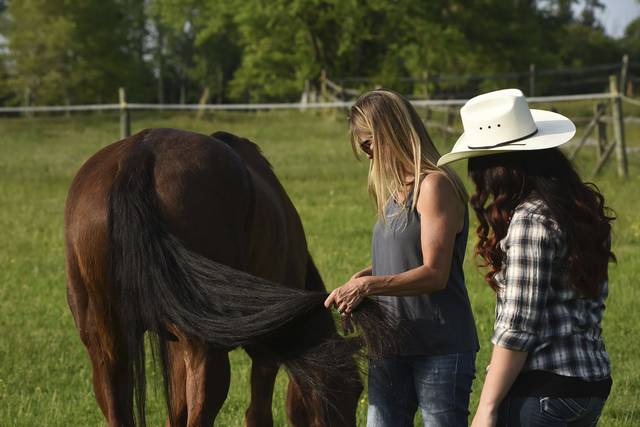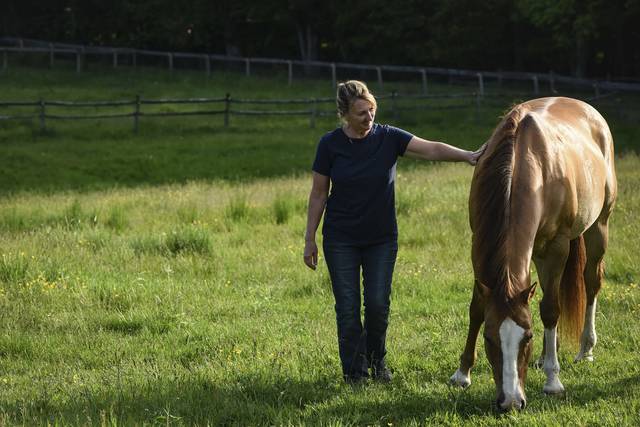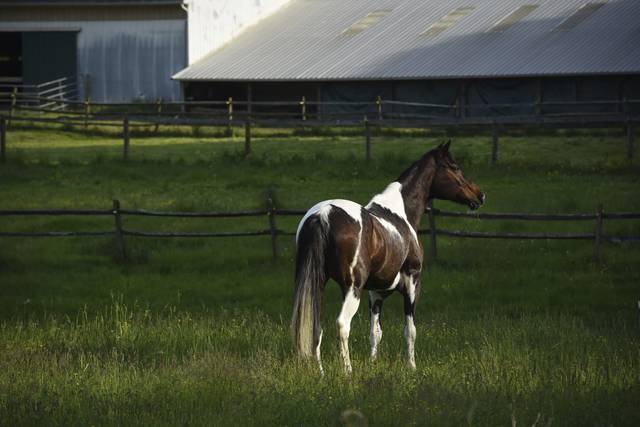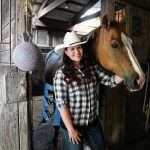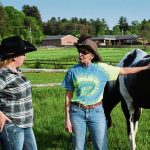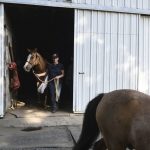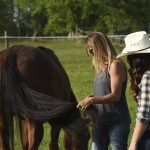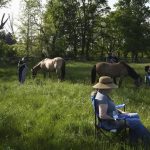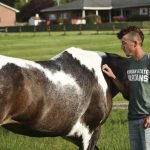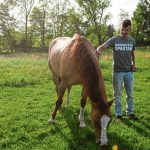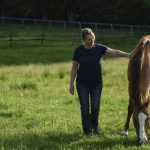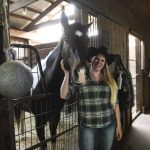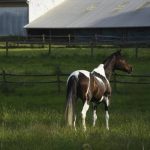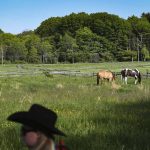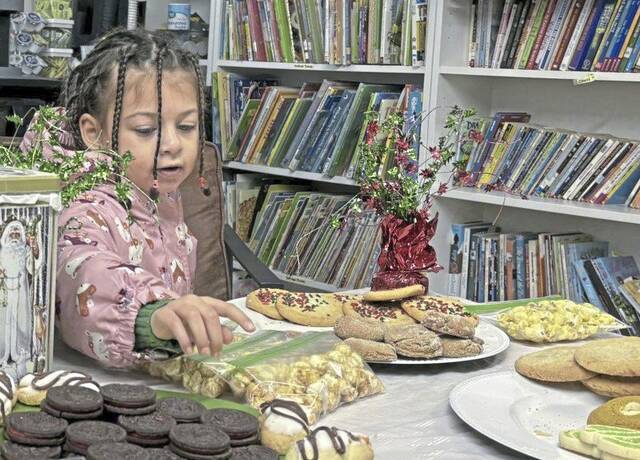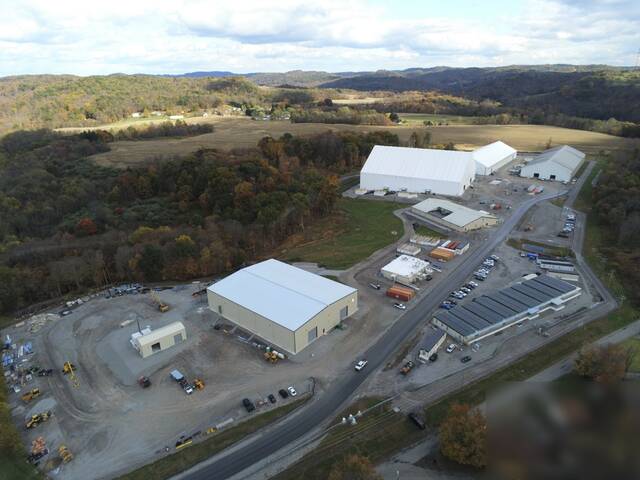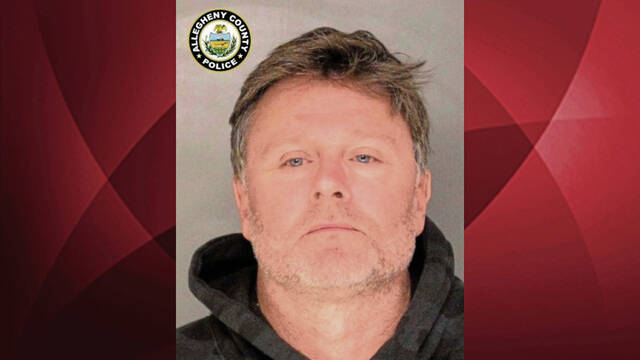They stand in a group mingling with horses of various colors and personalities.
They are people coping with anxiety, depression and trauma. And on this warm Friday evening, they’ve come for the kind of healing that animals, particularly horses, can provide.
They spoke to the Tribune-Review on the condition only their first names were used.
One of them is Tony, a 31-year-old slightly built man with dark features who calmly approaches Roxy, a majestic 20-year-old paint with brown and white patches. As they stand together in a corral during a mindfulness class at Divine Interactions Equine Facilitated Wellness in Avonmore , Roxy buddies up to Tony like an old friend.
This is not Tony’s first roundup. He’s been engaged in this type of therapy for a couple of years now.
For as long as he can remember, Tony has dealt with obsessive-compulsive disorder. His condition worsened after he moved from his native Michigan to Export to take a job as a technician on natural gas pipelines.
He liked his job but being away from family and friends made him feel isolated. He was lonely and depressed and worried that his mental state might cost him his job.
“It took me awhile to get the courage to go get help,” Tony said. “I wanted to meet people and that was the main thing the depression was holding me back from.”
In 2018, Tony started seeing Shanna Aughenbaugh, a licensed professional mental health counselor and also a horse owner. Eventually she offered equine-assisted psychotherapy (EAP) , a term originated by Greg Kersten in the early 1990s to describe the exercises he created to work with at-risk and incarcerated youth.
“I like animals and that’s what drew me to it,” Tony said. “We talked about my love for animals and her background with equine so it kind of went together. She’s the one who incorporated it with me..”
It was a lot of learning at first, but then Tony became more comfortable. One of the first things he learned was the similarity between horses and humans, and that with both species, isolation can lead to anxiety.
“I could relate to them by interacting with them, they’re herd animals, and feeling they could be going through what I’m going through,” he said. “One thing about horses I’ve learned is that for a horse to trust you, you have to be confident around them. They have to gain trust in you. That’s something I’ve struggled with — being a leader and showing confidence when you need to.”
Perhaps no one appreciates and understands the relationship people can have with horses better than Aughenbaugh, a 30-year-old Murrysville native who owns and operates Divine Interactions Equine Facilitated Wellness. Her first experiences with horses happened in Apollo.
The business is named after Divine, a red Appaloosa Aughenbaugh adopted as a fearful 2-year-old filly that wouldn’t allow anyone to get near her. Aughenbaugh was 13 at the time and had just lost a horse named Hope, Divine’s half-sister, in a tragic accident.
“Divine changed my life. We truly helped each other through that time in my life,” Aughenbaugh said. “That’s when I knew that I had to do something to utilize horses to help other people the way that I had experienced healing — with the help of horses.”
Seventeen years later, Divine is a gift that keeps on giving, not only inspiring the name of her business but also participating in therapy sessions.
Aughenbaugh offers what she describes as experiential psychotherapy sessions to people in an outpatient mental health treatment context.
Her partner in the endeavor is Samantha Boeser, 30, Apollo, owner of Boeser Equine and a horse professional Aughenbaugh has known since childhood. Sam, as she prefers to be called, decides which horses they will introduce to clients and advises them on herd behavior and how the horses are responding to them.
“Horses are masters of survival, so it’s teaching people that we should be more like a herd and not like a pack,” Boeser said. “That’s one of our philosophies, as well. In a pack, you think of wolves. Wolves will take each other out to become the leader of the pack. In a herd of horses, there’s no one true leader. Any horse in the herd, whether the lowest or highest of the pecking order, can alert the herd to danger and move the whole herd away from it.”
Aughenbaugh said in her practice they see people ranging in age from their teens to those in their 50s and 60s.
“We’ve definitely had a lot of young women and teen aged girls who have struggled with poor self-esteem and confidence, who are very socially anxious,” said Aughenbaugh. “Interacting with the horses gives them an opportunity in a controlled environment to really explore and find their voice, become more assertive, and learn how to set boundaries.”
But Aughenbaugh said men and teen boys respond particularly well to this treatment.
“They respond well to it because it’s a very active, hands-on approach rather than sitting on the couch.”
The therapy sessions take place mostly on the ground near the horses, although there is a riding element to it. And it’s all done bare back. No saddles allowed.
“For some clients, what makes them feel most accomplished is to be able to get on the horse at the end of treatment,” Aughenbaugh said. “Believe it or not, it’s safer to learn how to ride bareback because if you fall and you get your foot caught in the stirrup, that’s a way to get seriously injured.”
There was no riding during Friday’s open house. The session begins with meditation and then proceeds to a kind of meet and greet with the horses, Roxy, Divine and Troy, a 26-year-old quarter horse, who seem to enjoy the interaction with humans but are also preoccupied with chomping on the long grass in the pasture.
No one seems to mind including a 60-year-old woman from Verona named Janis who is attending a session for the first time. She said she has been dealing with anxiety issues.
“I think it’s just calming everything. To me it’s just a settling procedure,” said Janis. “When you are with the horses, you pick up that they’re settled and grazing. With horses it’s like an inside out thing. You don’t know things are going on inside of you and then you’re with a horse and they kind of draw that out of you almost. I don’t know how they do it but I know they’ve done it for me. You have to learn to trust and they help you to do that.”
Tony said the comfort he feels from being around the horses has helped ease his depression.
“It’s boosted all aspects of my mental health,” he said. “There’s definitely peace now in my life and that’s very important to me. I get more joy out of things. When you come from a darker place, you appreciate the little things more. With covid, so many are going through the isolation and starting over. For most people it’s been a year but for me it was 20 plus years that were taken away.”





